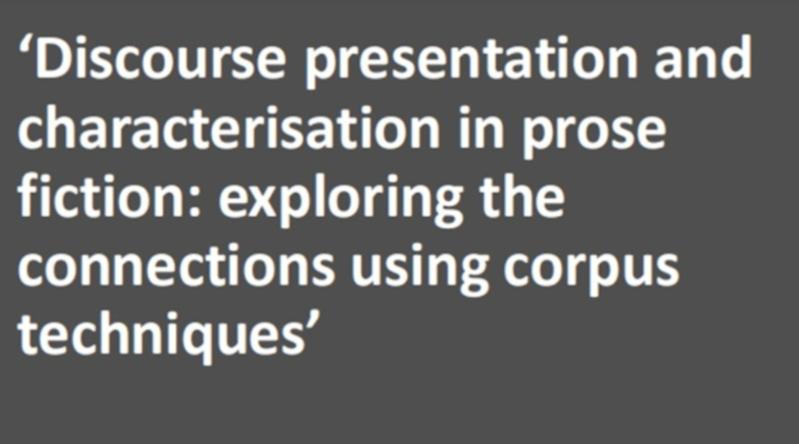‘Discourse presentation and characterisation in prose fiction: exploring the connections using corpus techniques’
- Date(s)
- March 4, 2025
- Location
- 26 University Square, Room 01/005
- Time
- 16:00 - 17:00
Brian Walker is a Visiting Scholar at Queen’s University Belfast. His research interests are in stylistics, discourse analysis, and corpus linguistics, especially applied to literary and political discourses. He has co-authored books on discourse analysis (Canning and Walker 2024), stylistics (Lugea and Walker 2023), corpus stylistics (McIntyre and Walker 2019) and socio-political keywords (Jeffries and Walker 2017). His other published research focuses on using corpus linguistic approaches to analyse poetry (McIntyre and Walker 2022), discourses of austerity (Jeffries and Walker 2019, 2020), and Early Modern English news pamphlets (Walker and McIntyre 2015)
Abstract
Discourse presentation and characterisation in prose fiction: exploring the connections using corpus techniques In Lugea and Walker (2023:97), we note that discourse presentation in fiction can contribute to the characterisation process because it can guide how readers evaluate characters and narrators. In this paper, I will explore the potential connections between discourse presentation and characterisation further by analysing the textual cues for characterisation in four short stories: two 1st person and two 3rd person. My focus is on the characterisation cues that are contained in discourse presentation (mainly speech) in the stories.
My paper will describe how I first manually identify Discourse Presentation (DP) in the four stories using a model first established by Leech and Short (2007 [1981]). I use machine readable versions of the short stories and record the results directly into the texts by adding XML-style mark-up. I then use the annotated versions of the stories to isolate the discourse presentation and look at how the different categories of SW&TP relate to characterization. For this step in my investigation, I analyse the characterization cues that are contained in the DP using Culpeper’s (2001) framework, as amended by Lugea and Walker (2023). I will finish by presenting the results of my analysis and discussing what they indicate about the role of Discourse Presentation in the characterisation process.
Notes:
Discourse Presentation (also known as Speech, Writing and Thought Presentation; SW&TP) prototypically, refers to a situation where a person presents the speech, writing or thought of another person (or themselves) sometime after the original words were spoken, written or thought.
Characterisation is the process of forming impressions of a characters (i.e. the people and other beings that inhabit fictional texts) and their characteristics (i.e. their personality traits and qualities). Readers form mental impressions of characters using relevant background knowledge and cognitive processes that are triggered by information relating to character in the text, known as textual cues for characterisation (see also Pfister, 1988; Rimmon-Kenan, 2002). Characterisation is therefore both cognitive and textual (see Culpeper 2001; Schneider 2001).
References
Culpeper, J. (2001) Language and Characterisation: People in Plays and Other Texts. London: Longman.
Leech, G. and Short, M. (2007 [1981]) Style in Fiction. Harlow, UK: Pearson Education Ltd.
Lugea, J. and Walker, B. (2023) Stylistics: Text, Cognition and Corpora. Cham, Switzerland: Palgrave Macmillan.
Pfister, M. (1988) The Theory and Analysis of Drama. Cambridge, UK: Cambridge University Press.
Rimmon-Kenan, S. (2002) Narrative Fiction. London: Methuen.
Schneider, R. (2001) Towards a Cognitive Theory of Literary Character: The Dynamics of Mental-Model Construction. Style 35, 4: 607–633

